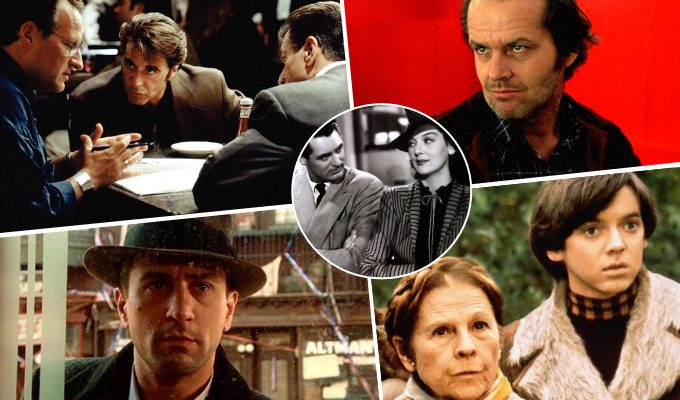“The Shining” (1980)
One of the biggest jokes, and painful ironies, of film awards history is that Kubrick was nominated for a Razzie, not an Oscar, for “The Shining.” Lol to the power of lol, ad infinitum. Even given the Academy’s afore-stated distaste for horror films, you’d think this Stephen King adaptation would have picked up something somewhere, even if only in a technical capacity (this is a film whose goddamn carpeting has become iconic)
 “The Shop Around The Corner” (1940)
“The Shop Around The Corner” (1940)
It’s borderline unthinkable to imagine a romantic comedy up for Best Picture now, but in the 1930s and 1940s, it was relatively common for them to win, let alone be shortlisted. Which makes it all the more puzzling that Ernst Lubitsch’s “The Shop Around The Corner,” one of the most perfect examples of the genre, would be overlooked. Was it the film’s celebration of a storybook Europe soon after the outbreak of war there? Or just a film seen as being too frothy for Academy tastes?
“Stardust Memories” (1980)
Few would argue that Woody Allen has been poorly treated by the Academy. The writer/director/star has four Oscars, and another 20 nominations, despite the fact that he never turns up. Which makes it baffling that the Academy would totally snub “Stardust Memories,” one of his best movies, while nominating him for disposable, middling fare like “Mighty Aphrodite” and “Match Point.” Was it deemed too self-indulgent?
“Sweet Smell Of Success” (1957)
In fairness, were a film like “Sweet Smell Of Success” to debut at some festival today (and, oh, would that it did), it’d likely pick up strong reviews, but be dismissed at the end of 140 characters by most critics as ‘not an awards movie.’ It’s true that Alexander Mackendrick’s masterpiece is one of the most savage and sour satires of showbusiness ever made, and there may have been a reluctance to bite the hand feeding voters, but it’s still a little shocking that it got absolutely no nominations, particularly given that, after a toxic preview screening, the film actually picked up good reviews.
“Three Kings” (1999)
These days, David O. Russell is an absolute Oscar magnet. His last three films have earned 25 nominations in the last four years, and “American Hustle” would have been the first movie since “Reds” to pick up nods in all four acting categories, had Russell’s own “Silver Linings Playbook” not managed the feat a year earlier. But when the filmmaker was a younger, unrulier (and better?) talent, he didn’t have the same luck, and the brilliant action-comedy “Three Kings” wasn’t nominated for anything. You could argue that 1999 was one of the most competitive years in recent memory for awards movies, but we’d counter that this was a year when “The Cider House Rules” received seven nods.
“Tokyo Story” (1953)
Seeing as how thoroughly Japanese the late master Yasujiro Ozu was, he probably never lost a blink of sleep for being overlooked by AMPAS throughout his whole career. Forever to remain his magnum opus, “Tokyo Story” is like a delicate, inexplicably potent flower that the Academy plainly found too alien for their tastes (though it’s at least something of an excuse that the film was released in the U.S. almost two decades after its hometown premiere).
 “Touch of Evil” (1958)
“Touch of Evil” (1958)
“Orson Welles at the Oscars” sounds like a title of a great documentary, except its running length would be, like, 12 minutes. You’ll notice we have much love for the man outside the obvious mammoth “Citizen Kane,” as his films almost always reached spectacular levels of greatness, only to end up spectacularly snubbed. Film noir classic “Touch of Evil” is no exception.
“Trouble In Paradise” (1932)
Billy Wilder’s films generally got the Oscar love they deserved (especially given that they were comedies), but his mentor Ernst Lubitsch wasn’t so lucky. The great director did receive three Best Director nominations, but many of his films went unrecognized, and along with “The Shop Around The Corner,” the most anger-inducing absence was his sparkling con-caper “Trouble In Paradise,” one of his very finest, and yet a film that didn’t pick up a single nod (even another of his masterpiece, the poorly-received-at-the-time “To Be Or Not To Be,” was on the Score shortlist).
“Walkabout” (1971)
As we said much earlier, Nicolas Roeg has never been Oscar nominated, and though that’s sometimes understandable (“Performance,” for instance, isn’t really an AMPAS movie), in other cases it’s more baffling. His early film “Walkabout,” about two children lost in the Australian outback, is perhaps the strangest one. You can perhaps excuse its Best Picture absence, but you’d have thought Cinematography, Editing, or Best Actress would have been in play. Sadly, it seems that Roeg was just too experimental for Academy tastes.
“What’s Up Doc?” (1972)
These days, the Oscar like to honor films paying tribute to the Golden Age of Hollywood — just look at the success of “The Artist.” But in the 1970s, it seems like they were looking forward rather than back. Peter Bogdanovich’s screwball comedy homage “What’s Up Doc” was a huge hit, but like its inspiration, “Bringing Up Baby,” proved too light to register in a year where “The Godfather” was the major awards juggernaut.

